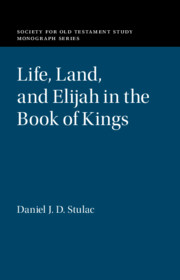Book contents
- Life, Land, and Elijah in the Book of Kings
- Society for Old Testament Study
- Life, Land, and Elijah in the Book of Kings
- Copyright page
- Dedication
- Contents
- Abbreviations
- Introduction
- 1 Solving for Pattern
- 2 The Body and the Earth (1 Kings 17–19)
- 3 A Native Hill (1 Kings 20–22)
- 4 Life Is a Miracle (2 Kings 1–8)
- 5 The Long-Legged House
- Conclusion
- Bibliography
- Index of Scriptures
- Index of Authors
- General Index
1 - Solving for Pattern
Published online by Cambridge University Press: 19 November 2020
- Life, Land, and Elijah in the Book of Kings
- Society for Old Testament Study
- Life, Land, and Elijah in the Book of Kings
- Copyright page
- Dedication
- Contents
- Abbreviations
- Introduction
- 1 Solving for Pattern
- 2 The Body and the Earth (1 Kings 17–19)
- 3 A Native Hill (1 Kings 20–22)
- 4 Life Is a Miracle (2 Kings 1–8)
- 5 The Long-Legged House
- Conclusion
- Bibliography
- Index of Scriptures
- Index of Authors
- General Index
Summary
Chapter 1 addresses five topics preliminary to the exegetical portions of this study: Kings’ compositional history, genre (especially in light of comparisons to Greek historiography), and rhetorical purpose, as well as a canonical approach to Kings and an agrarian reading strategy applied to Kings. As opposed to either factual history or fictional story, this volume argues that Kings is best described as a scripture directed at its readers’ theological imaginations. Such an observation suggests the validity of approaching the book from a canonical frame of reference, where its origins, shaping, and reception are understood to sit within a single field of compositional activity. Finally, Chapter 1 describes an agrarian hermeneutic as one reading strategy especially compatible with a canonical approach to the Bible at large.
Keywords
Information
- Type
- Chapter
- Information
- Life, Land, and Elijah in the Book of Kings , pp. 10 - 37Publisher: Cambridge University PressPrint publication year: 2020
